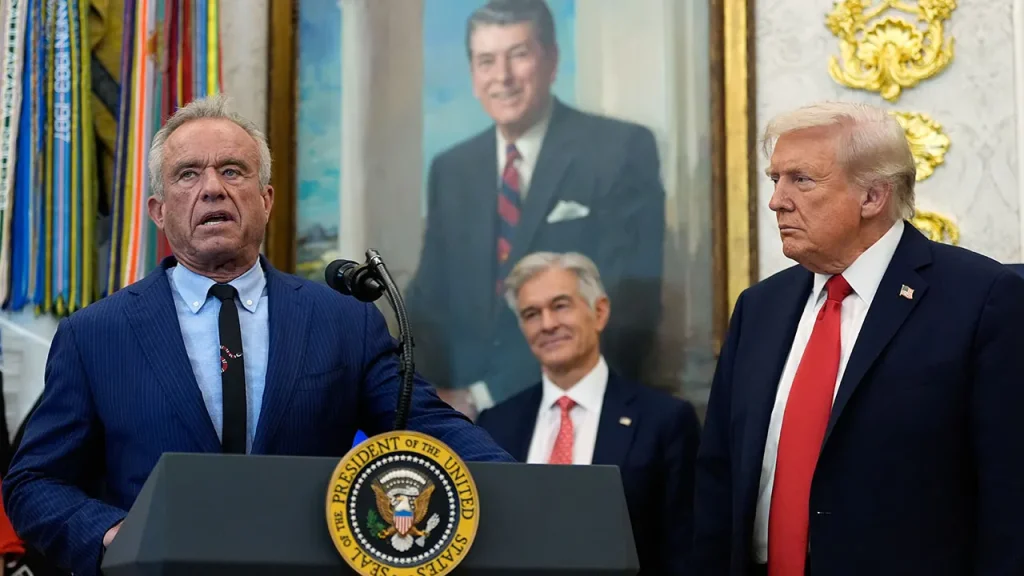Trump Announces Initiative to Make IVF More Affordable for American Families
President Donald Trump unveiled a significant initiative on Thursday aimed at expanding access to in vitro fertilization (IVF) treatments by addressing one of the biggest barriers to fertility care: cost. Speaking from the Oval Office, Trump emphasized his administration’s commitment to supporting American couples who dream of having children but struggle with fertility challenges.
“In the Trump administration, we want to make it easier for couples to have babies, raise children, and start the families they’ve always dreamed of,” the President stated during his announcement. The initiative focuses on two key priorities: reducing the prices of fertility medications and making the overall IVF process more financially accessible. At the heart of this effort is a groundbreaking agreement with EMD Serono, the world’s largest fertility drug manufacturer, which has committed to providing substantial discounts on fertility medications sold in the United States. This includes Gonal-f, a critical medication used in treating infertility in both women and men. According to administration officials, these discounts will reduce the cost of medications for a standard IVF cycle by between 42% and 79%, depending on the patient’s income level. Libby Horne, EMD Serono’s U.S. vice president of fertility and HIV/endocrinology, reinforced this commitment by announcing that Americans will now have access to the company’s leading IVF therapies at an impressive 84% discount off list prices.
The significance of this initiative becomes clear when considering the financial burden that IVF treatment places on American families. According to the U.S. Department of Health and Human Services (HHS), a single cycle of IVF typically costs between $15,000 and $20,000, with some cases exceeding $30,000. What makes this particularly challenging is that most patients require multiple cycles to achieve a successful pregnancy—with the average being 2.5 cycles. This means that many couples face total costs well over $40,000 in their journey to conceive through IVF. President Trump highlighted this reality during his announcement, noting that a single round of IVF in the United States can cost up to $25,000. The financial barrier has long prevented many Americans from accessing fertility treatments that could help them start or expand their families, making this initiative potentially life-changing for countless couples across the country.
This announcement represents a fulfillment of Trump’s February executive order, which directed federal agencies to identify ways to reduce IVF costs. It also aligns with his campaign promise to mandate free in vitro fertilization treatment for women if elected to a second term. Senator Katie Britt of Alabama, who joined Trump at the announcement, praised the initiative as “the most pro-IVF thing that any president in the history of the United States of America has done.” Britt, who Trump credited with bringing the issue of IVF access to his attention, has been a vocal advocate for expanding fertility treatment access. The initiative comes at a time when approximately one in eight American couples faces infertility challenges, according to statistics cited by EMD Serono.
The Centers for Medicare and Medicaid Services, led by Dr. Mehmet Oz, also expressed enthusiasm for the initiative’s potential impact. “There are going to be a lot of Trump babies. I think that’s probably a good thing,” Dr. Oz remarked during the announcement. This comment reflects the administration’s view that the initiative aligns with broader family-formation goals. The focus on making fertility treatments more accessible represents a significant policy development in reproductive healthcare, potentially helping thousands of families who have been financially blocked from pursuing IVF treatment. By targeting the cost of medications specifically, the initiative addresses one of the most significant components of overall IVF expenses.
As the program begins implementation, many families who have put their dreams of having children on hold due to financial constraints may now have new hope. The initiative demonstrates how public-private partnerships can create meaningful solutions to healthcare challenges without requiring extensive new legislation. By negotiating directly with pharmaceutical manufacturers, the administration has found a path to make immediate improvements in affordability while working within existing frameworks. For the millions of Americans struggling with infertility, this announcement represents more than just a policy change—it offers a potential pathway to parenthood that might otherwise have remained financially out of reach. As implementation details emerge, the impact of these cost reductions will likely be closely watched by healthcare providers, patient advocacy groups, and families throughout the country who have been waiting for more affordable fertility options.


